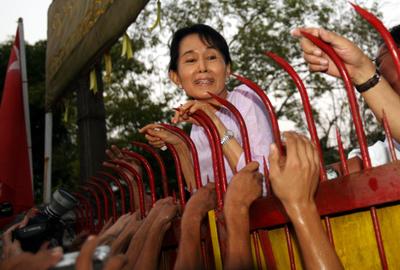This result neatly reversed the outcome of the 1990 elections in 1990 when the government party failed miserably against the enormously popular National League for Democracy, which won 80 per cent of the seats.
Critics scarcely recognise the significance of the 2010 election being conducted at all, even though 30 million voters were registered (of which perhaps 50 per cent turned out), 37 parties and numerous independent candidates competed, and at least 180 anti-government representatives were elected to the first parliamentary assemblies seen in Myanmar for 20 years.
Also for the first time, representatives of minority groups were elected to national and regional assemblies which give expression to the pluralistic and multi-cultural nature of Myanmar society. Moreover, the election campaign, which I was fortunate to witness, was characterised by great enthusiasm and ingenuity by candidates and their supporters alike, with relatively little interference from the authorities and the government censors, although the constant presence of security authorities could have been intimidating. For the first time in many years, issues and concerns of the people were aired publicly, including by candidates for the government party – albeit not very credibly in their case.
It can hardly be surprising that such ambitious elections were poorly run. But it is deeply disappointing that the numerous complaints by voters and parties, who genuinely believe they were cheated, seem unlikely to get any sort of reasonable hearing, despite timely warnings from the UN Secretary-General’s Special Envoy who has just paid his first visit to Myanmar. While the military regime may derive some comfort from their victory, despite the way it was achieved, they have not won greater legitimacy but have rather alienated people even further. They should surely realise now that the election process did not endanger national security, that political opposition is not of itself criminal and that the 2,100 political prisoners still in gaols can be released, and that the time has come for a more open, consultative and cooperative approach to politics.
Hopefully, this is what they envisage by allowing Aung San Suu Kyi her liberty at last. Rather than mindlessly blocking her every move, channeling the energies of Suu Kyi and her supporters into truly national causes and challenges is surely a worthwhile strategy. Above all, Suu Kyi could make a significant contribution to national reconciliation, and to bringing an end to internal tensions and differences, which the military leadership seems incapable of accomplishing. But will the present regime tolerate such a role by her, when she enjoys no formal political position? If lifting international sanctions is the price to pay, perhaps this is a viable way forward.
Nobody should be deluded by what is happening right now. There is no democracy in Myanmar and the same repressive military leadership remains in control, even if from behind the scenes. It has the capacity, and perhaps the suppressed inclination, to terminate the present opening up, just as it has all too often done in the past. But a very modest amount of political space exists for the moment where there was none before.
Much depends on how the military leadership decides to proceed, since they can determine this themselves; but for the moment they do not seem to be disclosing their intentions, beyond very general statements about handing over power to the people. But the appointment in February 2011 of a new government, based on the newly elected representatives, could provide an opportunity to collaborate on a different path ahead. Much more needs to be done, by the Burmese themselves as well as those who genuinely wish to help, to build on the modest outcomes achieved so far. But the international community can certainly do much more to encourage progress and reform – intelligently and carefully – than it has ever sought to do before.
Trevor Wilson is Visiting Fellow in Political and Social Change at the Australian National University and former Australian Ambassador to Burma.

